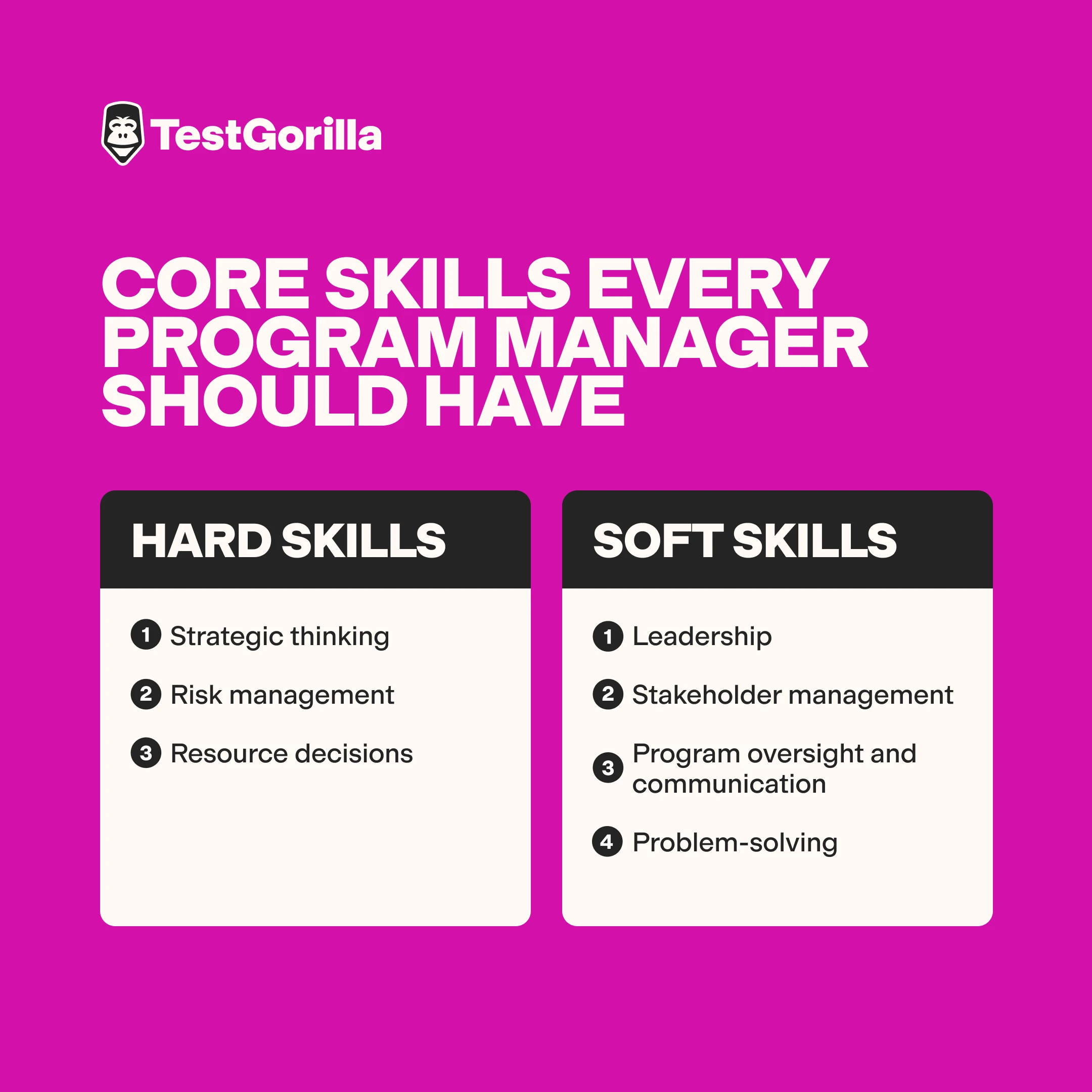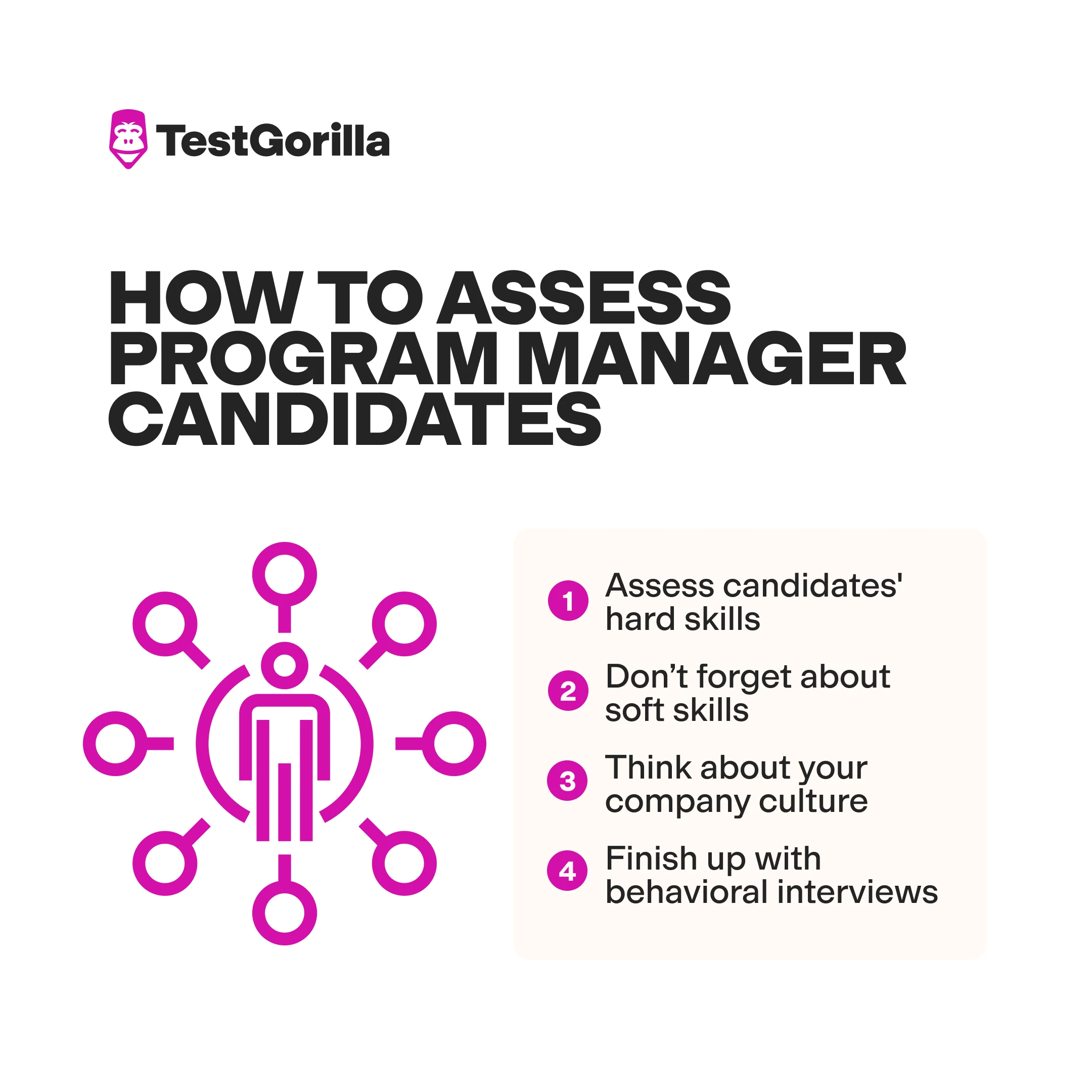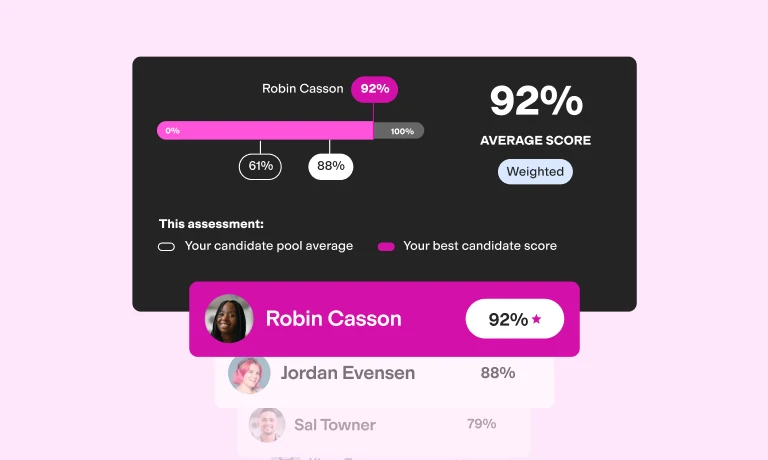Program managers have a lot on their plates. They need to juggle big-picture business goals with the nitty-gritty of daily tasks, while also dealing with stakeholders and making sure their team is on track.
If they slip up, they can miss objectives, strain partnerships, and steer your projects into chaos. Plus, the costs of hiring the wrong person can bring extra headaches. But the right program manager can help your projects run smoother, meet deadlines, and make sure your projects are in top-notch shape.
We can help you find that person. Below, we walk you through the seven essential skills program managers need to succeed, explain why these skills are key for good program management, and show you the best ways to pick the right candidates.
What is a program manager?
A program manager oversees a group of related projects to make sure they line up with the organization's big-picture goals. They handle multiple projects at once, work with various teams, and make important decisions that help the entire program succeed.
Day to day, a program manager makes sure resources are spread properly between projects, steps in to sort out any team squabbles, and keeps an eye on the clock to make sure everything’s ticking along as it should. They often work closely with project managers to keep tabs on how things are going, fix any upcoming issues, and keep projects from going over budget.
Program managers also need to keep everyone in the loop – from the higher-ups to the clients. They meet with company execs to make sure the program fits with what the organization wants to achieve. And, they chat with clients to make sure their needs are being met and their feedback is taken on board.
Core skills every program manager must have
Here are the key hard and soft skills program managers need to succeed in their role.
Hard skills
Strategic thinking: Program managers must set out a clear plan, like mapping out the steps for making software or organizing marketing efforts. They also have to make sure that every little project fits into the organization’s bigger picture goals.
Risk management: Program managers must keep an eye out for things that could go wrong and come up with ways to deal with them. This means creating plans to handle risks, keeping a close watch on how projects unfold, and making smart choices to keep the program running smoothly. For instance, if there's a risk of a project running late, the program manager might adjust schedules to avoid delays.
Resource decisions: A program manager makes sure resources – like money and employees – are used well across different projects. This means tracking budgets, moving people around when necessary, and making sure each project gets what it needs. For example, if a marketing campaign needs more email design, the program manager might get designers from another project to help out.
Soft skills
Leadership: Great program managers take charge of hectic, complicated projects. But they should never rule with an iron fist. Find candidates who can inspire teams from different parts of the company. They should help project managers, decide what's most important, and push for more teamwork to make sure projects stay on course.
Stakeholder management: Program managers’ opinions aren’t the only ones that matter. Find candidates who can manage relationships with anyone who has a “stake” in the program, including executives, clients, and team members. They need to keep parties steered toward the same goals, and if concerns pop up, they must manage them promptly.
Program oversight and communication: Program managers don’t need to be experts in every detail. But they do need to have a working knowledge of the specifics and be able to explain them. Find program managers who can give clear updates on progress and set realistic expectations – all while staying positive and respectful.
Problem-solving: Program managers are always putting out fires that can impact the program’s success. Look for candidates who can think fast, untangle complicated problems, and decide on solutions that keep everything running smoothly.
The best insights on HR and recruitment, delivered to your inbox.
Biweekly updates. No spam. Unsubscribe any time.
How to assess program manager candidates
While resumes help you glimpse a candidate’s background, they don’t offer any good proof that shows a candidate is right for a program manager role.
That’s where talent assessments come in. A talent discovery platform like TestGorilla offers “350+” tests covering technical skills, personality traits, and cognitive abilities, giving you a complete picture of each candidate’s potential. This way, you can ditch resumes and cover letters for fair, data-driven hiring decisions. Here’s how it works. Combine up to five of the following tests to make a comprehensive talent assessment for your program manager position. Also, try adding your own custom questions to make it unique to your role.
Here's how to assess candidates for program management roles:
Assess candidates' hard skills
Start with technical and role-specific tests to learn more about your candidate’s hard skills.
Our Program Management test sees if candidates can handle the whole program process, juggle resources, and meet what stakeholders need.
The Business Operations Management test checks how well applicants plan, organize, and control tasks across the company – like handling teams from different areas and keeping projects on schedule.
Our Budgeting test finds out which employees get the financial stuff, follow the financial rules, and can make and analyze budgets.
Don’t forget about soft skills
In addition to hard skills, test your candidates for softer skills needed to connect with stakeholders, lead teams, and handle complex projects. Here are some tests you might use:
Our Communication Skills test checks if candidates can share info clearly and listen well.
The Leadership and People Management test checks if a candidate knows how to effectively lead and support teams. It looks at practical skills – like handing out responsibilities and getting others on board with new ideas.
Our Problem Solving test measures how candidates tackle complex challenges and provide effective solutions.
Use additional personality tests to assess the other key traits of successful program managers. You might use the Enneagram, 16 Personalities, or DISC tests to assess adaptability, resilience, and motivation.
Think about your company culture
Hiring someone who can expand and challenge your existing culture is better than just hiring someone who will simply fit in. That’s because culture-add candidates can shake things up by preventing everyone from thinking the same way. This encourages fresh, creative ideas and boosts team productivity over time.
Try our Culture Add test to see how your candidate’s values line up with your organization’s. Also, identify the behaviors that would make your candidate a good influence on your company culture – and a good program manager.
Finish up with behavioral Interviews
Behavioral interviews let you delve deeper into candidates' experiences so you can understand how they handle real-world situations.
Ask questions like:
"Can you describe a time when you had to handle a complex stakeholder issue? How did you manage it, and what was the outcome?" This provides insight into problem-solving and stakeholder management skills.
"Tell me about a situation where you had to motivate your team during a demanding project. How did you approach it, and what was the response?" This helps assess their leadership style and ability to maintain team focus.
You can also use these questions to touch on topics your tests missed. For instance, you might ask about their risk management if none of your test questions addressed this.
For more helpful interview questions, check out these 36 behavioral interview questions for managers.
2 mistakes to avoid when assessing candidates
Watch out for these common mistakes when sizing up your program manager candidates.
1. Skipping over strategic alignment
Don’t just look at a candidate's project history. Check if they can line up projects with the company’s main goals.
Imagine you’ve got a program manager overseeing a software development project, a marketing campaign, and a customer service improvement initiative. These projects should all be pushing towards your company’s main target – say, cranking up customer happiness. The program manager needs to spread resources wisely across these projects to make sure they all help reach this ultimate goal.
Ask candidates how they've tied projects to a company's vision in the past. Their answer will show if they can think strategically and drive projects toward the company's overall success.
If you miss this part and move forward with the hire, you could end up with disjointed projects – and worse.
2. Not checking how they deal with key people
Don’t forget to check how well a candidate interacts with stakeholders like execs, clients, and teams. But this is more than just testing their communication skills. You need to make sure your program manager candidates can balance different interests, share updates clearly, and solve issues quickly.
Ask for examples of how they’ve managed tricky situations with people to keep the program on track. Their answer will show if they have what it takes to handle important stakeholders.
If you skip this, you could get stuck with a program manager who rubs people the wrong way, causes friction with the higher ups, and potentially derails your projects.
FAQs
Want to learn more? Take a look at these frequently asked questions.
What’s the difference between program manager and project manager?
Program managers handle lots of projects together, making sure they all fit the organization's goals. They're the big-picture people – handling resources, sorting out conflicts, and managing risks across all the projects.
In contrast, project managers zoom in on just one project. They're all about the nitty-gritty details, making sure a specific project task goes smoothly and hits its goals.
How do you write a job description for a program manager?
To create a good job description for a program manager, start by listing all the skills you need. Also, make the program's goals and the program manager’s responsibilities clear, and show how the program manager will work with different departments.
Learn more by checking out our guide on how to write a program manager job description.
Hire well-rounded program managers with TestGorilla
A program manager needs a solid skillset to help projects, programs, and companies succeed. But not all program management candidates will have all these skills. Some candidates may have awesome organization skills but ignore stakeholders. Or, some may be great at managing project budgets – but they won’t be the best multi-taskers.
That’s why having a comprehensive, science-backed assessment process is key to your hiring success. Resumes simply won’t cut it. With TestGorilla, you can choose from a wide range of tests to assess program managers’ technical skills, personality traits, and cognitive abilities.
See for yourself. Explore our library of “350+” tests, sign up for a live demo with a member of our team, or make a free TestGorilla account today!
You've scrolled this far
Why not try TestGorilla for free, and see what happens when you put skills first.




















